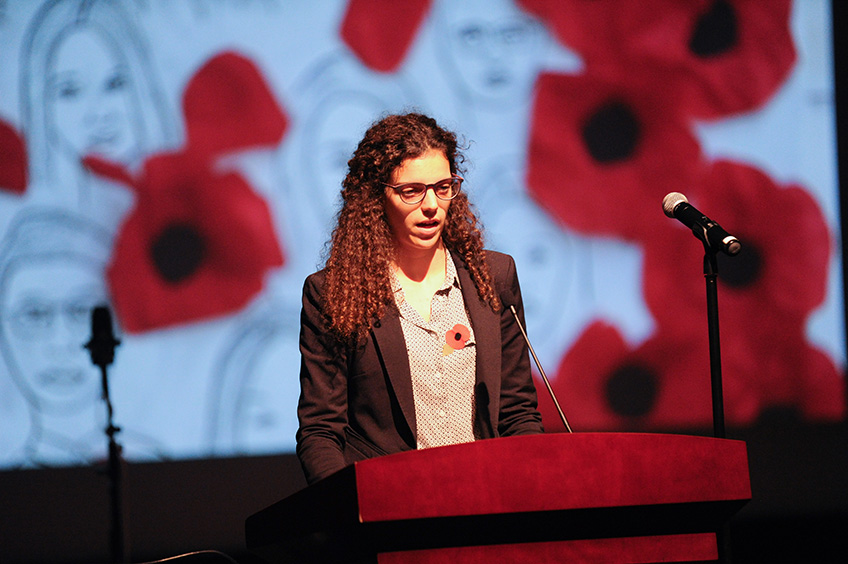How we remember, and why
 Remembrance Day is the name given to the one day in the year on which countries in the former British Empire mark to ‘remember’ their dead of the two world wars of the twentieth century. In Britain, as well as Canada, South Africa, India, Australia and New Zealand, it is on the 11th November. This date was chosen as it was on the 11th November 1918 that the fighting of the First World War ended. At the moment the guns stopped firing – 11 o’clock in the morning on the 11th day of the 11th month - people from all over these countries stand in silence for two minutes to remember all those who have given their lives for their countries.
It is not just the people of the former British Empire who choose this date to commemorate their dead: France, Belgium, Poland and the USA all use the 11th November to remember their veterans. The Germans have their ‘Volkstrauertag’ (national day of mourning) on the nearest Sunday to the 11th, and the Italians use the 4th November to remember their dead. Hong Kong, of course no longer part of the Commonwealth since 1997, continues to mark Remembrance Day.
These events are used by the people of these nations to come together, albeit briefly, to commemorate the lives and sacrifices of all those who fell for their countries in wars across the world.
One reason for the creation of a ‘Remembrance Day’ in 1921 was because of the terrible legacy of death and destruction of the First World War. It is estimated that 70 million people were in uniform between 1914 and 1918, with 9 million servicemen and women killed as a result of the fighting, and a further 6 million civilian casualties. It was a genuine world war because there was fighting across the globe, from Europe to Russia, South America to China.
In his poem Brothers, by the German writer Heinrich Lersch, he describes the horror of life as a soldier in the trenches. Poetry and ideas like this did much to encourage a determination for those left behind to ‘remember’.
Remembrance Day is the name given to the one day in the year on which countries in the former British Empire mark to ‘remember’ their dead of the two world wars of the twentieth century. In Britain, as well as Canada, South Africa, India, Australia and New Zealand, it is on the 11th November. This date was chosen as it was on the 11th November 1918 that the fighting of the First World War ended. At the moment the guns stopped firing – 11 o’clock in the morning on the 11th day of the 11th month - people from all over these countries stand in silence for two minutes to remember all those who have given their lives for their countries.
It is not just the people of the former British Empire who choose this date to commemorate their dead: France, Belgium, Poland and the USA all use the 11th November to remember their veterans. The Germans have their ‘Volkstrauertag’ (national day of mourning) on the nearest Sunday to the 11th, and the Italians use the 4th November to remember their dead. Hong Kong, of course no longer part of the Commonwealth since 1997, continues to mark Remembrance Day.
These events are used by the people of these nations to come together, albeit briefly, to commemorate the lives and sacrifices of all those who fell for their countries in wars across the world.
One reason for the creation of a ‘Remembrance Day’ in 1921 was because of the terrible legacy of death and destruction of the First World War. It is estimated that 70 million people were in uniform between 1914 and 1918, with 9 million servicemen and women killed as a result of the fighting, and a further 6 million civilian casualties. It was a genuine world war because there was fighting across the globe, from Europe to Russia, South America to China.
In his poem Brothers, by the German writer Heinrich Lersch, he describes the horror of life as a soldier in the trenches. Poetry and ideas like this did much to encourage a determination for those left behind to ‘remember’.
Brothers
Before our wire there lay for long a dead man, full in view. The sun burned down upon him, he was cooled by wind and dew. Day after day upon his pallid face I used to stare, And ever grew more certain: 'twas my brother lying there. And often as I looked at him outstretched before my gaze, I seemed to hear his merry voice from far-off peaceful days. And in my dreams I heard him crying out and weeping sore, Ah, brother, dearest brother, do you love me then no more?" At last I risked the bullets and the shrapnel-rain, and ran And fetched him in, and buried ... an unknown fellow-man. My eyes deceived me, but my heart proclaimed the truth to me: In every dead man's countenance a brother's face I see.
Captain Charlie May was not an unusual soldier – in many ways he was typical of the volunteers in the British army in 1916. He was not a career soldier, but chose to do his duty. This is one reason I have chosen to include this poignant extract, written to his wife on the evening before the battle of the Somme began on 1st July 1916. He was killed on that day, along with almost 20,000 other men. His great-grandson is a teacher at Wellington College. I do not want to die. Not that I mind for myself. If it be that I am to go, I am ready. But the thought that I may never see you or our darling baby again turns my bowels to water. I cannot think of it with even the semblance of equanimity. My one consolation is the happiness that has been ours. Also my conscience is clear that I have always tried to make life a joy for you. I know at least that if I go you will not want. This is something. But it is the thought that we may be cut off from one another which is so terrible and that our babe may grow up without my knowing her and without her knowing me. It is difficult to face. And I know your life without me would be a dull blank. You must never let it become wholly so. For to you will be left the greatest charge in all the world; the upbringing of our baby. God bless that child, she is the hope of life to me. My darling, au revoir. It may well be that you will only have to read these lines as ones of passing interest. On the other hand, they may well be my last message to you. If they are, know through all your life that I loved you and baby with all my heart and soul, that you two sweet things were just all the world to me. I pray God I may do my duty, for I know, whatever that may entail, you would not have it otherwise. Captain Charles May, 22nd Bn Manchester Regiment One of the most distinctive aspects of Remembrance in Britain is the wearing of red poppies. This is a tradition that began in 1921. Poppies grow on broken ground, and with the heavy shelling of the warfare so murderously characteristic on the Western Front, it was almost inevitable that they grew on the battlefields – some of the only plants to do so. As such, poppies soon became a rare source of colour for the soldiers, and ever since their image has been a source of comfort and reminder for those they left behind. Not everyone wears the same poppies, though. Opponents of war wore a white poppy. These are still produced by the Peace Pledge Union, a pacifist organisation that seeks to remind people of the horror and futility of war, but also recognise the losses of the wars of the 20th century. In France, the tradition is to wear not a poppy, but a bright blue cornflower, called the Bleuet de France. The money raised by the sale of these flowers goes to charities for servicemen and their families. One important part of Remembrance is the two minute silence that is marked every 11th November, at 11am exactly. It marks the moment the guns fell silent as the armistice, or ceasefire, came into effect in 1918. The next passage is from the Chilean poet Pablo Neruda. It is called Keeping Quiet, and whilst it was not written specifically about the First World War, its message of peace across the world is a universal one at the time of remembrance.Keeping Quiet
Now we will count to twelve and we will all keep still.
This one time upon the earth, let's not speak any language, let's stop for one second, and not move our arms so much.
It would be a delicious moment, without hurry, without locomotives, all of us would be together in a sudden uneasiness.
The fishermen in the cold sea would do no harm to the whales and the peasant gathering salt would look at his torn hands.
Those who prepare green wars, wars of gas, wars of fire, victories without survivors, would put on clean clothing and would walk alongside their brothers in the shade, without doing a thing.
What I want shouldn't be confused with final inactivity: life alone is what matters, I want nothing to do with death.
If we weren't unanimous about keeping our lives so much in motion,
if we could do nothing for once, perhaps a great silence would interrupt this sadness, this never understanding ourselves and threatening ourselves with death, perhaps the earth is teaching us when everything seems to be dead and then everything is alive.
Now I will count to twelve and you keep quiet and I'll go.
Wellington College suffered grievous losses in the wars of the 20th Century. In total, 725 old boys, teachers and school employees were killed between 1914 and 1918, with a further 594 in the Second World War. If you were going to observe a minute’s silence for each of them, you would be silent for 22 hours. But remembrance is not just about Wellington, or Britain, or even the empire; it is about all those who served and those they left behind. On a recent visit to the Western Front, I found two examples of how much wider the impact of the war had been. The first was whilst watching a parade that took place through the town of Ypres on 11th November. Joining the march through the town was a large group of Sikhs who had travelled to Belgium to remember their ancestors who fought and died in the war. Names of Sikh soldiers are on the famous Menin Gate memorial in Ypres and a Sikh regiment from the Tianjin garrison even fought the Germans here in China, during the siege of Tsingdao in 1914. Without the commitment, bravery and support of men like the Sikh soldiers, the war may very well have had a different result. The second example of the wider impact of the Great War was also in Ypres. Few people are aware of the role played by Chinese subjects in the conflict, but over 100,000 Chinese men served in the British and French armies during the war. Those who served in the British army formed the so-called Chinese Labour Corps who, between 1916 and 1920, helped the British war effort by keeping the soldiers supplied with food, ammunition and other supplies. I was lucky enough to have been able to visit the graves of 35 of these brave men while we were in Belgium. There are over 2,000 buried in similar cemeteries across the Western Front. I would like to conclude this piece on remembrance with a poem written not by a European writer, but by the famous Chinese poet Du Fu. It is called the Song of the Wagons. Although it is well over a thousand years old, this poem gives a strong sense of what it was like to be an ordinary solider in a massive army; I read the poem by the graveside of these Chinese Labour Corps men. These men lie in a cemetery of over 10,000 burials: men (and indeed one woman) from across the nations – American, French, British, Canadian, New Zealand, Australia; six of them are Old Wellingtonians; men from Europe, men from Asia; Christian burials as well as Jewish ones. There are even a number of Germans buried in that cemetery. So in a sense, even in that wet and windy corner of Belgium, an act of remembrance can help to bring people of the world together in their shared grief.Song of the Wagons
The wagons rumble and roll, The horses whinny and neigh, The conscripts each have bows and arrows at their waists. Their parents, wives and children run to see them off, So much dust's stirred up, it hides the Xianyang bridge. They pull clothes, stamp their feet and, weeping, bar the way, The weeping voices rise straight up and strike the clouds. A passer-by at the roadside asks a conscript why, The conscript answers only that drafting happens often. "At fifteen, many were sent north to guard the river, Even at forty, they had to till fields in the west. When we went away, the elders bound our heads, Returning with heads white, we're sent back off to the frontier. At the border posts, shed blood becomes a sea, The martial emperor's dream of expansion has no end. Have you not seen the two hundred districts east of the mountains, Where thorns and brambles grow in countless villages and hamlets? Although there are strong women to grasp the hoe and the plough, They grow some crops, but there's no order in the fields. What's more, we soldiers of Qin withstand the bitterest fighting, We're always driven onwards just like dogs and chickens. Although an elder can ask me this, How can a soldier dare to complain? Even in this winter time, Soldiers from west of the pass keep moving. The magistrate is eager for taxes, But how can we afford to pay? We know now having boys is bad, While having girls is for the best; Our girls can still be married to the neighbours, Our sons are merely buried amid the grass. Have you not seen on the border of Qinghai, The ancient bleached bones no man's gathered in? The new ghosts are angered by injustice, the old ghosts weep, Moistening rain falls from dark heaven on the voices' screeching."
Julian Jeffrey Second Master and history teacher Wellington College International Tianjin Second Master, Julian Jeffrey’s undergraduate degree was in History from the University of Durham, with a postgraduate Teacher Training qualification (PGCE) from the University of Exeter. He has taught in London, at one of the top independent girls’ schools in the UK, as well as Wellington College in Berkshire. It was here that he spent almost 18 years, as head of history and assistant housemaster, but the role involved far more than that. Initially combining the role with a part time lecturing position at the University of Reading, he took on a range of academic responsibilities including A level examinations’ officer and lead teacher for staff training and development. In addition to his teaching roles, Julian was a governor of an independent preparatory school in Surrey for six years and a freelance educator for the Holocaust Educational Trust charity since 2009.相关资讯













